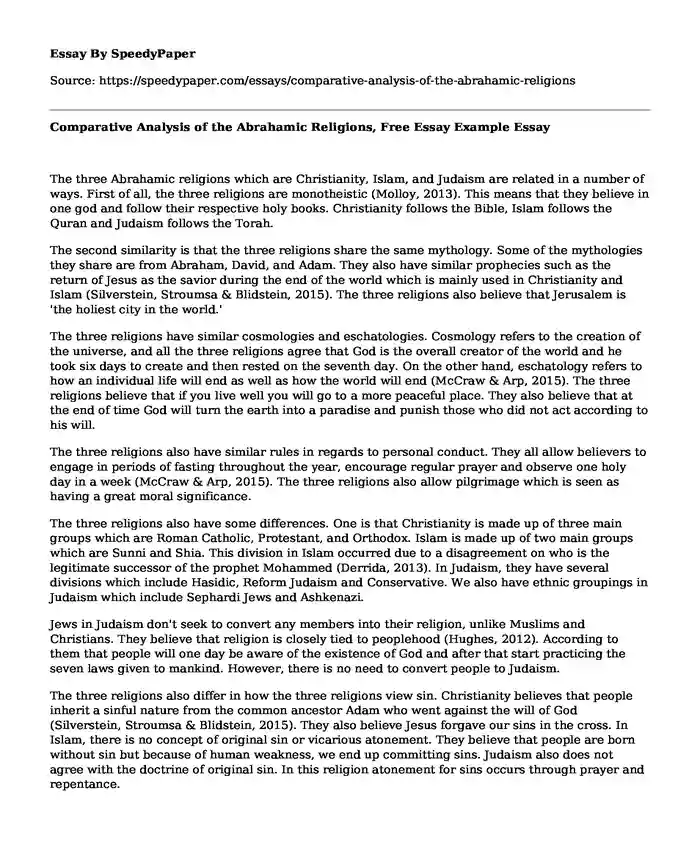
| Type of paper: | Essay |
| Categories: | Islam Christianity |
| Pages: | 3 |
| Wordcount: | 662 words |
The three Abrahamic religions which are Christianity, Islam, and Judaism are related in a number of ways. First of all, the three religions are monotheistic (Molloy, 2013). This means that they believe in one god and follow their respective holy books. Christianity follows the Bible, Islam follows the Quran and Judaism follows the Torah.
The second similarity is that the three religions share the same mythology. Some of the mythologies they share are from Abraham, David, and Adam. They also have similar prophecies such as the return of Jesus as the savior during the end of the world which is mainly used in Christianity and Islam (Silverstein, Stroumsa & Blidstein, 2015). The three religions also believe that Jerusalem is 'the holiest city in the world.'
The three religions have similar cosmologies and eschatologies. Cosmology refers to the creation of the universe, and all the three religions agree that God is the overall creator of the world and he took six days to create and then rested on the seventh day. On the other hand, eschatology refers to how an individual life will end as well as how the world will end (McCraw & Arp, 2015). The three religions believe that if you live well you will go to a more peaceful place. They also believe that at the end of time God will turn the earth into a paradise and punish those who did not act according to his will.
The three religions also have similar rules in regards to personal conduct. They all allow believers to engage in periods of fasting throughout the year, encourage regular prayer and observe one holy day in a week (McCraw & Arp, 2015). The three religions also allow pilgrimage which is seen as having a great moral significance.
The three religions also have some differences. One is that Christianity is made up of three main groups which are Roman Catholic, Protestant, and Orthodox. Islam is made up of two main groups which are Sunni and Shia. This division in Islam occurred due to a disagreement on who is the legitimate successor of the prophet Mohammed (Derrida, 2013). In Judaism, they have several divisions which include Hasidic, Reform Judaism and Conservative. We also have ethnic groupings in Judaism which include Sephardi Jews and Ashkenazi.
Jews in Judaism don't seek to convert any members into their religion, unlike Muslims and Christians. They believe that religion is closely tied to peoplehood (Hughes, 2012). According to them that people will one day be aware of the existence of God and after that start practicing the seven laws given to mankind. However, there is no need to convert people to Judaism.
The three religions also differ in how the three religions view sin. Christianity believes that people inherit a sinful nature from the common ancestor Adam who went against the will of God (Silverstein, Stroumsa & Blidstein, 2015). They also believe Jesus forgave our sins in the cross. In Islam, there is no concept of original sin or vicarious atonement. They believe that people are born without sin but because of human weakness, we end up committing sins. Judaism also does not agree with the doctrine of original sin. In this religion atonement for sins occurs through prayer and repentance.
In Judaism, they believe that the truth is found in the Old Testament while Christianity believes in both the old and New Testament. On the other hand, Islam believes that the bible was tampered with by the authors although they believe the prophets (Hughes, 2012). The Quran makes several references to the biblical personas.
References
Derrida, J. (2013). Acts of religion. Routledge.
Hughes, A. W. (2012). Abrahamic Religions: On the Uses and Abuses of History. Oxford University Press.
McCraw, B. W., & Arp, R. (2015). Introduction. In The Concept of Hell (pp. 1-11). Palgrave Macmillan, London.
Molloy, M. (2013). Experiencing the world's religions: Tradition, challenge, and change. McGraw-Hill.
Silverstein, A. J., Stroumsa, G. G., & Blidstein, M. (Eds.). (2015). The Oxford handbook of the abrahamic religions. Oxford Handbooks in Religion a.
Cite this page
Comparative Analysis of the Abrahamic Religions, Free Essay Example. (2022, Apr 15). Retrieved from https://speedypaper.com/essays/comparative-analysis-of-the-abrahamic-religions
Request Removal
If you are the original author of this essay and no longer wish to have it published on the SpeedyPaper website, please click below to request its removal:
- With Competition Fierce - Article Analysis Essay Example
- Visiting Paris Essay Example
- Essay Sample on Colonization and Resistance of Indio-America
- Free Essay Example: Psychological Theory and Practice
- Interview with Marguerite Loucas, Business Essay Example
- Anxiety Management Essay Example
- Essay Sample: Management of Culcinema
Popular categories




